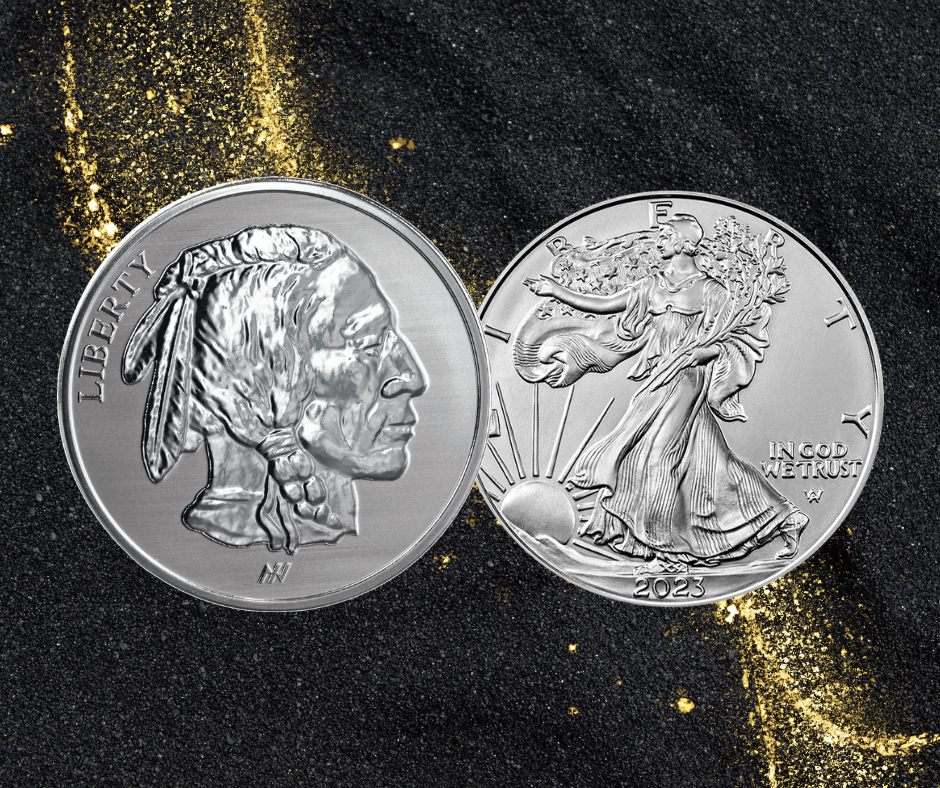Silver Round vs. Silver Coin: What is the Difference?
Within the realm of silver investments, two options typically emerge. One of the most common questions I get is which of these two options is a better investment. These are silver rounds and silver coins, but what is the difference between them, and which one should you buy?
Silver Rounds:
Silver rounds are bullion coins minted by private mints rather than the government. They are typically made of .999 fine silver and come in various sizes and designs. Unlike coins (like the Eagle or Maple), rounds do not carry face value and are not considered legal tender. Instead, their value comes from the metal itself.
Pros:
- Lower Premiums: Silver rounds often come with lower premiums than government-issued coins. This gives the added benefit of buying more metal for your dollar. Your goal may be to gain as much of the metal as possible. If so, the round is one of the cheapest ways to do that in one-ounce increments. With the potential for silver to increase in value, rounds are a cheap entry-point.
Cons:
- Lack of Recognition: Rounds are not legal tender. Because of this, they may not be as easily recognizable or accepted as payment in certain situations.
- If you were trying to barter with someone using a round and that person was not already well-versed in the precious metals market, they might feel more comfortable using an item with government backing. Name recognition goes a long way!
- Resale Value: The value of silver rounds is primarily tied to the spot price. However, because government-issued coins demand higher premiums, you are likelier to get more on the buyback when you sell back coins instead of rounds. You spend less when buying rounds, but you most likely receive less when you sell them back as well.
Silver Coins:
Silver coins, on the other hand, are minted by government entities and are typically considered legal tender within their respective countries of origin. Examples include the American Eagle, Canadian Maple Leaf, British Britannia, South African Krugerrand, Australian Kangaroo, and Austrian Philharmonic. These coins also contain .999 fine silver (just like a round) but carry a face value that the issuing government assigns.
Pros:
- Legal Tender Status: Silver coins are recognized as official currency and can be used as legal tender to make purchases at their face value.
- Global Recognition: Popular government-issued silver coins are widely recognized and accepted worldwide. This can be advantageous for international transactions or in times of crisis. Again, someone may have never heard of whatever private mint your rounds are coming from, but everyone has heard of the United States or Canada!
- Resale Value: You are more likely to get more back when you resell an American Eagle than you are for a round. This is true because Silver Eagles can be resold more than the round can because of their premiums.
Cons:
- Higher Premiums: Coins often come with higher premiums than rounds, reflecting their official status. This results in a higher initial investment cost for investors to reach the same amount of silver they would if they were buying rounds. It is important to remember that you are acquiring less silver for your dollar, so if the price jumped significantly, you would benefit less because you received less.
Conclusion
In conclusion, rounds and coins offer investors a tangible way to own silver. The choice between the two ultimately depends on your individual preferences and investment goals. While rounds may offer lower premiums, coins provide the added benefits of legal tender status and global recognition.
